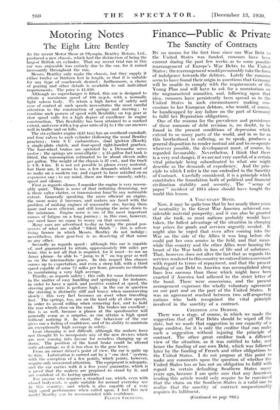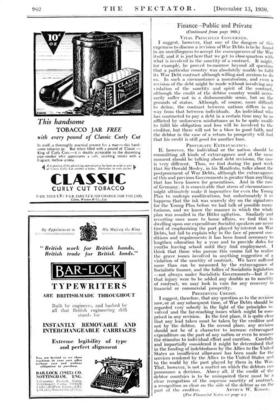Finance—Public & Private
The Sanctity of Contracts
By no means for the first time since our War Debt to the United States was funded, rumours have been current during the past few weeks as to some possible rearrangement of Europe's War Debts to the United States ; the rearrangement would presumably take the form of indulgence towards the debtors. Lately the rumours seem to have found their origin in assertions that Germany will be unable to comply with the requirements of the Young Plan and will have to ask for a moratorium OR the unguaranteed annuities, and, following upon that idea, rumours have persistently been spread as to the United States in such circumstances making con- cessions to her European debtors, who would, of course, be handicapped by any failure on the part of Germany to fulfil her Reparation obligations.
One of the reasons for the prevalence and persistence of these rumours of debt revision is, no doubt, to be found in the present conditions of depression which extend to so many parts of the world, and in so far as this brotherhood in suffering, so to speak, produces a general disposition to render mutual aid and to co-operate wherever possible, the development must, of course, be regarded favourably. Nevertheless, I think that there is a very real danger, if we are not very careful, of a certain vital principle being subordinated to what one might describe as the demands of expediency. And the prin- ciple to which I refer is the one embodied in the Sanctity of Contract. Carefully considered, it is a principle which constitutes the foundation both of political and financial civilization stability and security. The "scrap of paper" incident of 1914 alone should have taught the world this lesson.
A VOLUNTARY BOND.
Now, it may be quite true that by her nearly three years of neutrality in the Great War America achieved con- siderable material prosperity, and it can also be granted that she took, as most nations probably would have taken, the fullest advantage of the situation in charging war prices for goods and services urgently needed. It might also be urged that even after coming into the War on the 'side of the Allies it was long before she could put her own armies in the field, and that mean- while this country and the other Allies were bearing the brunt of the War both in loss of life and of substance. That, however, does not alter the fact that as regards the services rendered to this country we entered into a covenant with regard to terms of repayment, and that the present funding of our Debt to America was accomplished along lines less onerous than those which might have been exacted if America had adhered to the strict letter of the bond. There' were concessions, and the -present arrangement expresses the wholly voluntary agreement on our part and on the part of the United States. It was an agreement reached between two self-respecting nations who both recognized the vital principle involved in the sanctity of a contract.
CREDITOR AND DEBTOR.
There was a stage, of course, in which we made the suggestion that all War Debts should be wiped off the slate, but we made that suggestion in our capacity of a large creditor, for it is only the creditor that can make such a suggestion without injuring the principle of contract. The other great creditor took a different view of the situation, as it was entitled to take; and hence the funding of our own Debt, which was followed later by the funding of French and other obligations to the United States. I do not propose at this point to make any comments upon the question of whether the United States has or has not an obligation to fulfil with regard to certain defaulting Southern States many years ago, because I am quite sure that any American reading this article would only require to be convinced that the claim on the Southern States is a valid one to realize that the sanctity of contract unquestionably requires its fulfilment.
(Continued on page 962.) Finance—Public and Private (Continued from page 990.) VITAL PRINCIPLES CONCERNED.
I suggest, however, that one of the dangers of this eagerness to discuss a revision of War Debts is to be found in an unwillingness to accept the consequences of the War itself, and it is just here that we get to close quarters with what is involved in the sanctity of a contract. It might,' for example, he proved to-morrow beyond all question that a particular country was absolutely unable to fulfil its War Debt contract although willing and anxious to do so. In such a circumstance a moratorium, and even a revision of the debt might be made without involving any violation of the sanctity and spirit of the contract, although the credit of the debtor country would neces- sarily suffer not in a dishonourable sense, but on the grounds of status. Although, of course, more difficult to define, the contract between nations differs in no way from that between individuals. An individual who has contracted to pay a debt in a certain time may be so afflicted by unforeseen misfortunes as to be quite unable to fulfil his obligation and loss will be involved to the creditor, but there will not be a blow to good faith, and the debtor in the case of a return to prosperity will find that his credit is still good for another loan.
PROFLIGATE EXTRAVAGANCE.
If, however, the individual or the nation should be committing all kinds of extravagance and at the same moment should be talking about debt revisions, the ease is very different. Thus, we find durim,' the past week that Sir Oswald Mosley, in his Manifesto, talks about the postponement of War Debts, although the extravagance of this and previous Governments is greater than anything that has been known for generations. And in the case of Germany, it is conceivable that stress of circumstances might ultimately make it imperative for even the Young Plan to undergo modifications, but unfortunately it so happens that the ink was scarcely dry on the signatures for the Young Plan before we had talk of possible mora- toriums, and we know the manner in which the whole plan was assailed in the Hitler agitation. Similarly and reverting once more to home affairs, we find that in dwelling upon our expenditure Socialist speakers are never tired of emphasizing the part played by interest on War Debts, but fail to explain why in the face of present con- ditions and requirements it has been found necessary to lengthen education by a year and to provide doles for youths leaving school until they find employment. I think that those who pursue this course fail to realize the grave issues involved in anything suggestive of a violation of the sanctity of contract. We have suffered more than can be measured by the extravagance of Socialistic finance, and the follies of Socialistic legislation —not always under Socialistic Governments—but if to that injury were to be added any doubts as to sanctity of contract, we may look in vain for any recovery in financial or commercial prosperity.
PRESERVING CREDIT.
I suggest, therefore, that any question as to the revision now, or at any subsequent time, of War Debts should be regarded very soberly in the light of the principles in- volved and the far-reaching issues which might be com- prised in any revision. In the first place, it is quite clear that any lead taken must be taken by the creditor and not by the debtor. In the second place, any revision should not be of a character to increase extravagant expenditure on the part of any nation or even to remove the stimulus to individual effort and exertion. Carefully and impartially considered it might be determined that in the funding of indebtedness by the Allies to the United States an insufficient allowance has been made for the services rendered by the Allies to the United States and to, the world by the part played by them in the War.
i That, however, s not a matter on which the debtors can pronounce a decision. Above all, if the credit of the debtor countries is to be unimpaired there must be a clear recognition of the supreme sanctity of contract, a recognition as clear on the side of the debtor as on the
(Far Financial Notes see page x.)















































 Previous page
Previous page